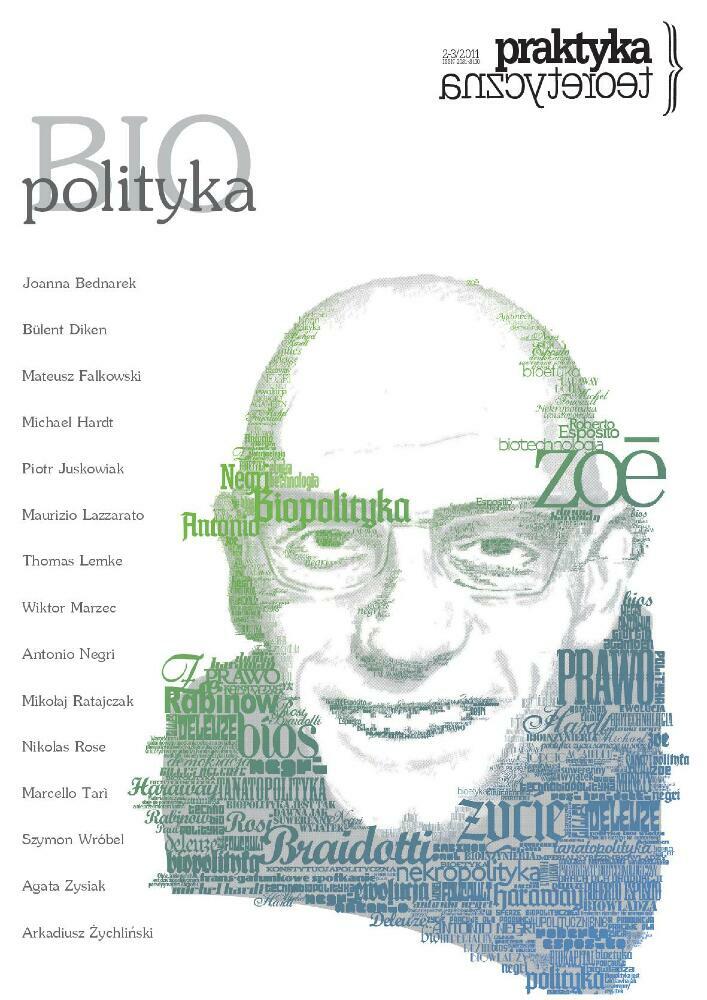Abstract
If we reject the idea of chronological suc-
cession of liberal democracy and totalitarian systems
and acclaim the genealogical perspective instead, we
will notice another structural division or rift. Here it is
not at stake the vertical di_erentiation between totali-
tarianism and liberal democracy but the horizontal one:
democracy and communism (as a radicalisation of
egalitarianism) vs. biopolitics (consisting of two anti-
thetical, but complementary forms: Nazism and liber-
alism, state and individual biopolitics). In Nazism
human being is its own body, for liberalism (from Locke
ahead), human owns his/her body, so is able to use it,
change it and even sell it. In this light Nazism in its
basic categories reverses the liberal perspective and grant
the possession of the body to the state instead of indi-
vidual, not leaving behind the very conditions of bio-
political thinking.
I argue, that biopolitical character of liberalism dif-
ferentiates it from democracy and communism mostly.
Essay attempts to analyse above mentioned opposition
in vertical, as well as horizontal dimension, in order to
have a more in-depth insight in the roots of totalitarian
systems and to put under scrutiny the liberal sources
of contemporary biopolitical regimes.
References
Arendt H. 1989. Korzenie totalitaryzmu. t. 1-2. Warszawa: Niezależna Oficyna Wydawnicza.
Arendt H. 2000. Kondycja ludzka. Warszawa: Fundacja Aletheia.
Esposito R. 2007. „Totalitaryzm czy biopolityka?”. Przegląd Polityczny 82 : 122-128.
Foucault M. 1995. Wola wiedzy. W Historia seksualności. Warszawa: Czytelnik.
Foucault M. 2000. Rządomyślność. W Filozofia. historia. polityka: wybór pism. Warszawa: Wydawnictwo Naukowe PWN.
Foucault M. 2004. Naissance de la biopolitique: cours au college de France (1978-1979). Paris: Seuil.
Friedrich C. J. 1953. The Unique Character of Totalitarian Society. W Totalitarianism Proceedings of a Conference Held at the American Academy of Art and Sciences. Cambridge: Harvard University Press.
Friedrich C. J., Brzezinski J. 1966. Totalitarian Dictatorship and Autocracy. New York: Harvard University Press.
Gleanson A. 1995. Totalitarianism: the Inner History of the Cold War. Oxford: Oxford University Press.
Haraway D. 1997. Modest_Witness @ Second_Millennium. New York: Routledge.
Hardt M., A. Negri. 2004. Multitude: War and Democracy in the Age of Empire. New York: Penguin Books.
Herer M. 2010. Od tłumacza. W M. Foucault. Bezpieczeństwo. terytorium. populacja. Warszawa: Wydawnictwo Naukowe PWN.
Lefort C. 2006. „O odmowie przemyślenia totalitaryzmu”. Przegląd Polityczny 79/80 : 157-162.
Lemke T. 2001. “The Birth of BioPolitics – Michel Foucault’s Lecture at the College de France on Neo-Liberal Governmentality”. Economy & Society 30 (2) : 190–207.
Müller-Armack A. 1966. Wirtschaftsordnung und Wirtschaftspolitik: 1. Auflage. Freiburg im Breisgau.
Rüstow A. 1955. Wirtschaftsethische Probleme der sozialen Marktwirtschaft. W Der Christ und die soziale Marktwirtschaft. Stuttgart-Köln.
Strauss L. 2009. O tyranii. Kraków: Wydawnictwo Uniwersytetu Jagiellońskiego.
Śpiewak P.. Jak możliwa jest myśl polityczna po Szoa?. http://www.math.uni.wroc.pl/~kisiel/Salon/spiewak.pdf.
Talmon J. L. 2005. „Korzenie demokracji totalitarnej”. Przegląd Polityczny 69 : 1-8.
License
“Theoretical Practice” seeks to put into practice the idea of open access to knowledge and broadening the domain of the commons. It serves the development of science, thinking and critical reflection. The journal is published in open-access mode under the CC-BY-NC-SA 4.0 license (detail available here: http://creativecommons.org/licenses/by-nc-sa/4.0/). Articles published in the journal may be freely distributed, stored, printed and utilized for academic and teaching purposes without restrictions.
They should not be, however, used for any commercial purposes or be reconstructed into derivative creations. Access to the journal may not be limited or offered for a fee by any third party.
Prospective authors are obliged to fill in, sign and send back the publishing contract compliant with the CC licencing. [PL.pdf, PL.doc, EN.pdf,EN.doc].
According to this contract, authors grant the journal a non-exclusive right to publish their work under the creative commons license (CC-BY-NC-SA 4.0) without any financial obligation on both sides of the contract.
Before submission authors should make sure that derivative materials they use are not protected by copyright preventing their non-commercial publication. Authors are responsible for any respective copyright violations.
